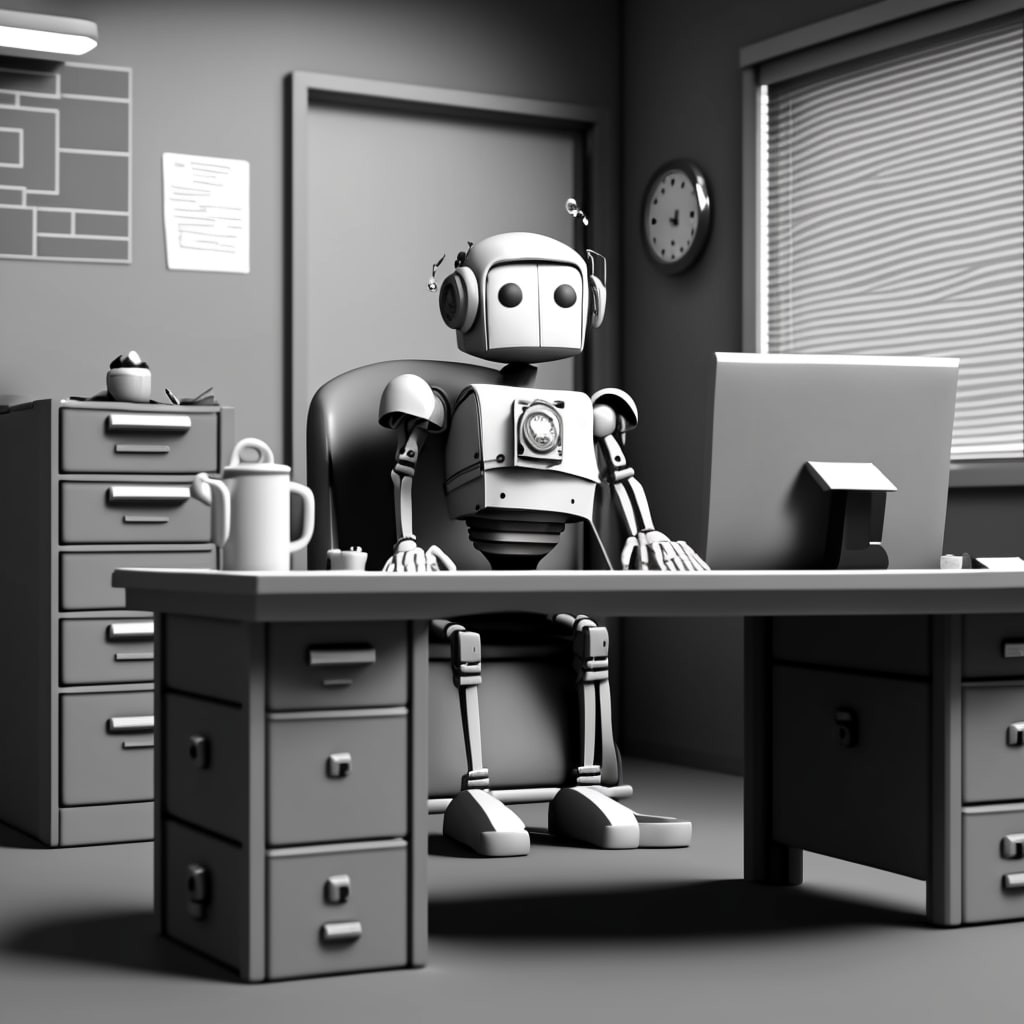HR Self-Service: How can AI be used for HR purposes?
AI or Artificial Intelligence can be used for different Human Resource purposes. AI can notify the suitable candidates with the required skill sets prior to a job being posted. AI-powered candidate matching uses HR data to predict whether an applicant will accept a job offer, how well they will do on the job, and how long they will stay in the job.

Wouldn't you want a Human Resources Assistant you could trust? I do!
Let’s try to imagine a day with an AI assistant together. Let’s say the CEO decided to invest in Artificial Intelligence to help the HR team with the administrative work. The AI was set up to deal with employee questions, payroll, and other HR tasks.
AI was able to quickly analyze data and answer simple employee queries like benefits. The AI also provided the HR team with valuable insights and data that they could use to make better decisions. AI was able to provide data on employee satisfaction and productivity, and the team was able to make changes to improve the work environment and engagement.
The team was able to concentrate on the more creative aspects of their work, such as engaging with people and revisiting outdated HR policies and procedures, while the AI handled the administrative tasks. As a result, the team was more productive, and the company was able to scale better, leaner, and faster.
We'll look at how AI is changing how we manage human resources (HR) and what the pros and cons of using AI in HR might be.
What is AI in HR, exactly?
AI in HR refers to the use of artificial intelligence and automation in HR functions such as recruiting, onboarding, performance management, learning and development, compensation and benefits, and more. AI is often used in HR for things like chatbots for onboarding new employees, analytics and predictive analysis for managing employee performance, automated interviewing systems, and intelligent learning platforms for training and developing employees.
What are the benefits of using AI in HR?
Automation, efficiency, and cost savings: Automation is one of the main advantages of AI for HR. This can save time and money, as well as reduce the possibility of human error. AI can also assist in streamlining processes to make them more efficient and cost-effective.
How can AI assist in each human resources function?
- Talent Acquisition: AI-powered tools can be used to screen resumes to reduce the risk of biases and suggest the best candidates for a position. AI can also be used to automate the scheduling of interviews and provide feedback to candidates. Having a system is also beneficial for the database, and once candidates are hired, we should reevaluate whether the person we interviewed corresponds to the person at work. This helps reshape the interview questions. AI could also help with generating Linkedin employer brand related posts.
- Onboarding: A.I.-driven Onboarding recommends who each new hire should meet, what they should read, and when they should meet over the first three months on the job.
- Performance Management: AI-powered tools can be used to track employee performance and provide feedback to employees with support of managers and colleagues. This can help to ensure that employees are meeting their goals and can help to identify areas for improvement.
- Learning and Development: Artificial intelligence will play a significant role in the process of employee development. This will include identifying prospective capabilities more rapidly as well as presenting the optimal pathways for development and progress, including keeping track of individual development and advising on new skills to keep up with the talent market.
- Employee Engagement: AI-powered tools can be used to track employee engagement and analyze results and comment while coming up with engagement action plan recommendations. This can help to ensure that employees are engaged and motivated to do their best work.
- Talent Management/Succession Planning: AI can provide data-driven insights on potential successors that can help HR teams make better decisions. AI can be used to identify skills and competencies of potential successors, analyze their performance data, and predict their future job performance. AI can also be used to identify potential gaps in leadership and provide recommendations on how to fill them. AI can also be used to automate the tracking and evaluation of employee performance, allowing HR teams to monitor progress on succession planning goals over time.
- Compensation and Benefits: AI can be a great asset to HR teams in managing total rewards programs. AI can help improve existing compensation programs by providing insights on employee salary and performance data. AI can also be used to calculate total compensation packages tailored to individual employees and automate tasks related to benefit administration.
How to implement AI in HR?
1. Leverage AI-driven HR Analytics: HR can use AI-driven HR analytics to predict trends more accurately as more employee data becomes available. But always keep in mind that garbage in, garbage out. Clean, precise data must be present in the system in order to have good data analytics, which support your understanding of employee satisfaction, productivity, and retention.
2. Utilize AI-driven Chatbot Solutions: AI-powered Chatbots can create a more personalized experience for job seekers and employees, leveraging natural language processing to make the process faster and more efficient for simple enquiries. However, the person must be reachable when necessary.
3. Use AI-driven Compensation Solutions: AI-driven compensation solutions can be used to help make decisions on employee promotions, pay increases, and bonuses. Generally speaking, this appears as a suggestion to the manager. For instance, following a performance review, a percentage range may be suggested to the manager for a salary increase or whether to include the person for promotion based on the justified criteria.
4. Automate Administrative Tasks: HR teams can speed up the completion of repetitive tasks by automating some of their administrative tasks using AI-powered bots. However, pay close attention to the policy, process, and procedure to see if any of them are required. Instead of automating it if it's outdated, remove it. If people can't remember the procedure or keep calling to ask how to do it, the process should be adjusted.
5. Implement Artificial Intelligence-Powered Performance Management Tools: AI-powered performance management tools can assist HR in identifying, measuring, and tracking key performance indicators and data. More importantly, track irrelevant goals.
Examples of AI in HR.
1. Automated Recruiting: AI-powered recruiting uses advanced algorithms, natural language processing, and machine learning to evaluate candidates and match them to job openings based on skills and experience.
2. Predictive Analytics: Predictive analytics leverages past data to build models and identify patterns, which help HR professionals strategize their operations and spot potential problems or risks.
3. Retaining Talent: AI-powered analytics can be used to learn more about how to keep employees, such as which activities that keep employees engaged have the most effect on retention and which employees are most likely to leave.
4. Evaluating employee performance and keeping track of their goals: AI-powered tools can be used to evaluate and keep track of employee performance, as well as to set meaningful goals that are in line with the organization's overall goals. Goals should always be in line with what's most important for the business, and each person should have their own take on it, not the same for all.
Disadvantages of AI in HR.
AI has its own set of disadvantages in the workplace. It can automate routine tasks and speed up processes, but it can also make it harder for employees to communicate with management. This is because AI lacks the human touch required to get people to collaborate and get along. Some new hires may leave because they feel left out or because there is no one to turn to when things get tough. HR is all about people, and HR professionals' role is to understand and meet the needs and goals of their employees. However, AI will never be able to fully comprehend how people feel and what motivates them.
Here are some of the drawbacks of AI in HR.
1. Unethical Use: AI technology has the potential to collect and use personal data without informed consent, leading to potential unethical practices such as biased hiring decisions and algorithmic bias which violates law in some countries.
2. Cost: AI technology can be expensive, especially if it requires specialized training or assistance.
3. Limited Capabilities: AI systems can only do what they are programmed to do, so they may not be able to respond quickly to changing situations and can be easily manipulated by bad users.
4. Job Displacement: AI technology has the potential to replace humans in some aspects of human resources, resulting in job displacement and potential resistance from HR professionals.
AI technology holds vast potential in the field of Human Resources, as it can provide companies with better data to inform decision-making and streamline certain HR processes. From automating mundane tasks such as payroll calculations to optimizing talent recruitment and predicting performance, AI can be used to maximize efficiency and drive business growth.
By being mindful of the potential risks of AI, HR departments can harness its potential to make the workplace more productive and successful for all. It is critical for organizations to strike a balance between AI and human interaction in order to foster a positive and productive workplace culture.
About the Creator
Pleng
I'm Pleng, passionate about Scaling Business with People and AI. Let's connect! #talentmanagement #humanresources #AIinHR #futureofwork






Comments
There are no comments for this story
Be the first to respond and start the conversation.